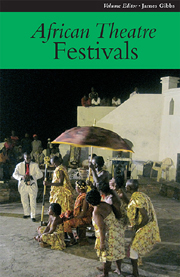Book contents
- Frontmatter
- Contents
- Notes on Contributors
- Obituary of Efo Kodjo Mawugbe
- Introduction by James Gibbs
- Festivals as a Strategy for the Development of Theatre in Zimbabwe 1980–2010
- The Legacy of Festac '77
- Festac, Month by Month & Soyinka's Involvement
- The Dakar Festivals of 1966 & 2010
- African Renaissance between Rhetoric 30 & the Aesthetics of Extravagance FESMAN 2010 – Entrapped in Textuality
- Theatre Programme for FESMAN & Commentary
- The Pan-African Historical Theatre Festival (PANAFEST) in Ghana, 1992–2010
- PANAFEST through the Headlines
- International Festivals & Transnational Theatre Circuits in Egypt, 1988–2010
- The Jos Theatre Festival 2004–2011
- The Grahamstown Festival & the Making of a Dramatist An interview with ANDREW BUCKLAND
- Playscript
- Book Reviews
Festivals as a Strategy for the Development of Theatre in Zimbabwe 1980–2010
Published online by Cambridge University Press: 05 May 2013
- Frontmatter
- Contents
- Notes on Contributors
- Obituary of Efo Kodjo Mawugbe
- Introduction by James Gibbs
- Festivals as a Strategy for the Development of Theatre in Zimbabwe 1980–2010
- The Legacy of Festac '77
- Festac, Month by Month & Soyinka's Involvement
- The Dakar Festivals of 1966 & 2010
- African Renaissance between Rhetoric 30 & the Aesthetics of Extravagance FESMAN 2010 – Entrapped in Textuality
- Theatre Programme for FESMAN & Commentary
- The Pan-African Historical Theatre Festival (PANAFEST) in Ghana, 1992–2010
- PANAFEST through the Headlines
- International Festivals & Transnational Theatre Circuits in Egypt, 1988–2010
- The Jos Theatre Festival 2004–2011
- The Grahamstown Festival & the Making of a Dramatist An interview with ANDREW BUCKLAND
- Playscript
- Book Reviews
Summary
Because of Zimbabwe's recent history many might consider the development of theatre in that country and the role played by festivals in it to be a special case. However, it is possible that the question of festivals as a strategy for the development of theatre in the Zimbabwean context may suggest parallels to readers in other countries in Africa and elsewhere.
The well-known Zimbabwean playwright and authority on various aspects of arts and culture, Stephen Chifunyise, writes a weekly column in The Herald newspaper called ‘Theatre Corridors’. On 2 December, 2010, he wrote an article headlined ‘Festival showcases future dance stars’. He was referring to the Jikinya National Primary Schools Traditional Dance Competition. In the following week, he went on to discuss festivals in general in his column and provided a useful survey of those currently existing in Zimbabwe. There are four international festivals: the Harare International Festival of the Arts (HIFA), the Zimbabwe International Film Festival (ZIFF), the International Images of Women in Film Festival (IIFF) and the Buddyz Annual Festival of the Arts (BAFA), which is largely a regional festival founded in 2006 by the Patsimeredu Edutainment Trust, which brings together in Harare community-based theatre initiatives from all over the country and the Southern African region.
- Type
- Chapter
- Information
- African Theatre 11: Festivals , pp. 1 - 13Publisher: Boydell & BrewerPrint publication year: 2012

